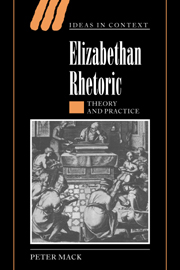Book contents
- Frontmatter
- Contents
- Acknowledgements
- Introduction
- 1 Rhetoric in the grammar school
- 2 Rhetoric and dialectic at Oxford and Cambridge
- 3 English-language manuals of rhetoric and dialectic
- 4 Everyday writing: notebooks, letters, narratives
- 5 Histories, conduct manuals, romances
- 6 Political argument
- 7 Elizabethan parliamentary oratory
- 8 Religious discourse
- Conclusion
- Bibliography
- Index of rhetorical and dialectical terms
- General index
- IDEAS IN CONTEXT
5 - Histories, conduct manuals, romances
Published online by Cambridge University Press: 22 September 2009
- Frontmatter
- Contents
- Acknowledgements
- Introduction
- 1 Rhetoric in the grammar school
- 2 Rhetoric and dialectic at Oxford and Cambridge
- 3 English-language manuals of rhetoric and dialectic
- 4 Everyday writing: notebooks, letters, narratives
- 5 Histories, conduct manuals, romances
- 6 Political argument
- 7 Elizabethan parliamentary oratory
- 8 Religious discourse
- Conclusion
- Bibliography
- Index of rhetorical and dialectical terms
- General index
- IDEAS IN CONTEXT
Summary
The attraction of the idea of education was so great in sixteenth-century England that many forms of vernacular writing justified themselves primarily as vehicles for moral teaching. Sir Philip Sidney's principal claim for poetry, which he sees as embracing all forms of fiction, is that it is a more effective form of moral teaching than history or philosophy. History, conduct manuals and romances are the most often printed genres of secular writing in English in the sixteenth century. My argument in this chapter will be that these three popular genres of Tudor vernacular writing are linked and that both in subject-matter and in form they draw on the resources of rhetorical education. I shall show that histories, conduct manuals and romances share six common features: moral stories, ethical sentences, techniques of amplification, speeches and letters, debate, and shared themes. All these common features are connected with and illuminated by the procedures of Tudor rhetorical education. Most are features of grammar school teaching, which provides both material (moral sentences, stories, commonplace themes) and methods for storing, varying and presenting it. Texts in all three genres reuse material from earlier writings and in turn present subject-matter for further reuse. This means that passages from a romance may derive part of their meaning from debate with sections of a conduct book or a chronicle and vice versa.
- Type
- Chapter
- Information
- Elizabethan RhetoricTheory and Practice, pp. 135 - 175Publisher: Cambridge University PressPrint publication year: 2002



